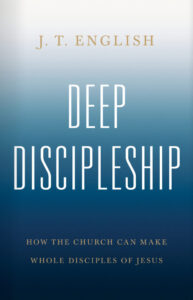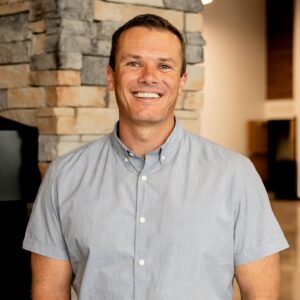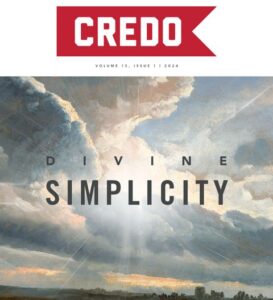Why does theology matter in the local church? In this interview with J.T. English, pastor of Storyline Church and author of Deep Discipleship and You Are a Theologian, Credo Editor Lance English poses questions that get to the heart of the nexus between theological education and discipleship within the local church. JT passionately advocates for the resurgence of the church’s role in profound theological formation, stressing the primacy of the local church as the optimal environment for shaping and equipping believers. He adeptly navigates the challenge of balancing theological depth with accessibility in teaching, employing the principle of “comprehend high, communicate low” to ensure the richness of theology is made accessible to all. Through insightful recommendations, personal anecdotes, and theological reflections, JT English illuminates the path toward deep discipleship, highlighting key classical doctrines while demonstrating their ongoing relevance for the church today.
As a pastor and author of Deep Discipleship and You Are a Theologian, how do you envision the role of theological education within the local church context?
 The primary context for discipleship is the local church. I am deeply thankful for Christian ministries outside of the local church that prioritize theological education and discipleship. God has used Bible colleges, seminaries, and other nonprofits to further his mission in the world. As a matter of fact, my own life has been deeply enriched by such institutions. However, the primary place that God desires to shape and form his people is in the local church. Unfortunately, we are living in a moment in which so many churches have relegated this responsibility of deep discipleship and theological formation to other institutions. The good news is that many churches are retrieving their calling of deep discipleship and theological education. Across the country and around the globe, I hear of church-based institutes and training programs that aim to equip the saints in the church. This is good news indeed.
The primary context for discipleship is the local church. I am deeply thankful for Christian ministries outside of the local church that prioritize theological education and discipleship. God has used Bible colleges, seminaries, and other nonprofits to further his mission in the world. As a matter of fact, my own life has been deeply enriched by such institutions. However, the primary place that God desires to shape and form his people is in the local church. Unfortunately, we are living in a moment in which so many churches have relegated this responsibility of deep discipleship and theological formation to other institutions. The good news is that many churches are retrieving their calling of deep discipleship and theological education. Across the country and around the globe, I hear of church-based institutes and training programs that aim to equip the saints in the church. This is good news indeed.
Many churches struggle with balancing the need for deep theological understanding and the desire to keep teachings accessible. How do you strike that balance at Storyline, especially in the context of discipleship programs?
 I can definitely understand why this can be challenging. One of the main principles that we have found helpful is to comprehend high and communicate low. I want our teachers and leaders to comprehend high. That means that we want to work to understand the richness of the Christian tradition in the deepest possible way. I have my leaders reading theologians like Athanasius, Irenaeus, Bavinck, and Calvin, among others. What I’ve found is that they love engaging theology at this level, but it’s not just enough to comprehend high, I also want them to be able to communicate low. That means I want them to make theology accessible to everyone. That doesn’t mean dumbing things down, it means learning to have the ability to translate deep theology into ordinary terms. It is also important to have different kinds of learning environments or a different level of education is taking place. In other words, I preach very differently on Sunday than how I teach in our year-long theological development program – The Storyline Institute. We believe that having multiple education environments allows us to teach to various levels of development.
I can definitely understand why this can be challenging. One of the main principles that we have found helpful is to comprehend high and communicate low. I want our teachers and leaders to comprehend high. That means that we want to work to understand the richness of the Christian tradition in the deepest possible way. I have my leaders reading theologians like Athanasius, Irenaeus, Bavinck, and Calvin, among others. What I’ve found is that they love engaging theology at this level, but it’s not just enough to comprehend high, I also want them to be able to communicate low. That means I want them to make theology accessible to everyone. That doesn’t mean dumbing things down, it means learning to have the ability to translate deep theology into ordinary terms. It is also important to have different kinds of learning environments or a different level of education is taking place. In other words, I preach very differently on Sunday than how I teach in our year-long theological development program – The Storyline Institute. We believe that having multiple education environments allows us to teach to various levels of development.
If you could recommend only one theological book for every member of your church to read, what would it be and why?
If I could have one member of my congregation read only one book, it would be Athanasius, O n the Incarnation. I would have them read this book for several reasons: 1) It shows how accessible ancient authors can be. 2) It is a wonderful example of theological method. 3) It is a great example of how theology is meant to lead to piety and worship. 4) It centers the entirety of Scripture and the Christian faith on the person and work of Christ.
n the Incarnation. I would have them read this book for several reasons: 1) It shows how accessible ancient authors can be. 2) It is a wonderful example of theological method. 3) It is a great example of how theology is meant to lead to piety and worship. 4) It centers the entirety of Scripture and the Christian faith on the person and work of Christ.
Are there specific theological topics or doctrines that you find particularly important for the members of your church to understand deeply as they engage in discipleship and ministry?
I think the next several decades will be an opportunity for Christians to retrieve the important theological categories of image-bearing and ecclesiology. I want my church to have a basic literacy in these categories because I find that not only is our culture deeply confused about what it means to be a person and what it means to belong to a community, but so are many Christians.
If you could have dinner with any theologian, past or present, who would it be, and what would you be most excited to discuss with them?
If I could have dinner with one theologian, it would be Augustine. I would want to discuss being a pastor-theologian with him.
Balancing life in the ministry with a young family can be challenging. How do you maintain a healthy work-life balance, and what activities or hobbies bring you and your family personal joy and fulfillment?
Learning to balance life, ministry, and family can be challenging. One lesson that I feel God has been teaching me recently is that to say yes to one thing is to say no to another. My wife and I have been talking a lot recently about how our primary goals fall into the categories of faith, family, fun, friends, and fitness. That basically means if it falls outside of those categories, it is a no for us. One thing that we are really enjoying is a family right now is taking fun trips together. We just know that this season of having young kids is going to fly by in the blink of an eye, so we are trying to enjoy it by making fun memories.
What is your favorite Christian doctrine, and why?
The doctrine that I returned to again and again is the doctrine of the Trinity. Trinitarianism was a focus for me during my ThM at Dallas Seminary and was also the focus of my dissertation at Southern. Now, as a pastor, I continually find myself returning to it because it is the grounding for every other Christian doctrine. Who God is and what God does is all that matters.
This issue of Credo Magazine is on Divine Simplicity. When did you first encounter this doctrine, and how would you teach it to your kids?
Wow, really giving me the softball questions here! I first encountered this doctrine during my master’s work, and I’ve only grown more convinced of its importance since then. If I were teaching Divine Simplicity to my kids, I would relate it to their affections. The sinful human heart desires to love and worship many things. We can find our affections going in many different directions and being captivated by many things. But divine simplicity reminds us that God is one and not composed of many parts. God is his essence, and he alone is worthy of all of our affection and joy.
Can you share a significant moment or event in your spiritual journey that had a profound impact on your theological perspective and approach to ministry?
Shortly after I came to Faith in college, I approached my pastor and told him I was eager to grow in my understanding of the Bible and the basic beliefs of Christianity. I will never forget what he said to me next. He said, “Oh, you want to grow?! Great, that means you need to go to seminary.” I said, “What is seminary?” I think about that conversation often. I could not be more thankful for my seminary experience. And I’m thankful for the continued opportunities that I have to train the next generation of ministers in the seminary context. However, I often find myself wondering, why didn’t he say the church? It was at that moment that I became convinced that theological education and discipleship should primarily happen in the context of the local church.
Listeners of Knowing Faith know that you are a big West Wing fan. In “Two Cathedrals,” President Bartlett reflects on divine providence and wrestles with the idea of God’s presence in the face of personal and national challenges. What pastoral counsel would you give him if you happened to be in the cathedral that day?
The Two Cathedrals episode of The West Wing is the best hour of television, in my opinion. I’ve probably watched it 20 times. I love it because the President is wrestling, as you mentioned, with providence, the goodness of God, suffering, and a desire to serve. What is so powerful about that moment, is we’ve all had moments where we’ve wrestled with those topics in one way or another. If I was with the president that day in the cathedral, my pastoral counsel to him would simply be to be present with him. In moments like this, we often don’t need a new treatise on providence and human suffering – we just need someone to be with us. One of my friends says, we shout truths about God in the light, so we can stand upon them in the dark. In that cathedral, I would just want to stand with President Bartlet in the dark – hoping that earns me the right to shout truths about God in the light.
Image credit: Andrew Milligan sumo


